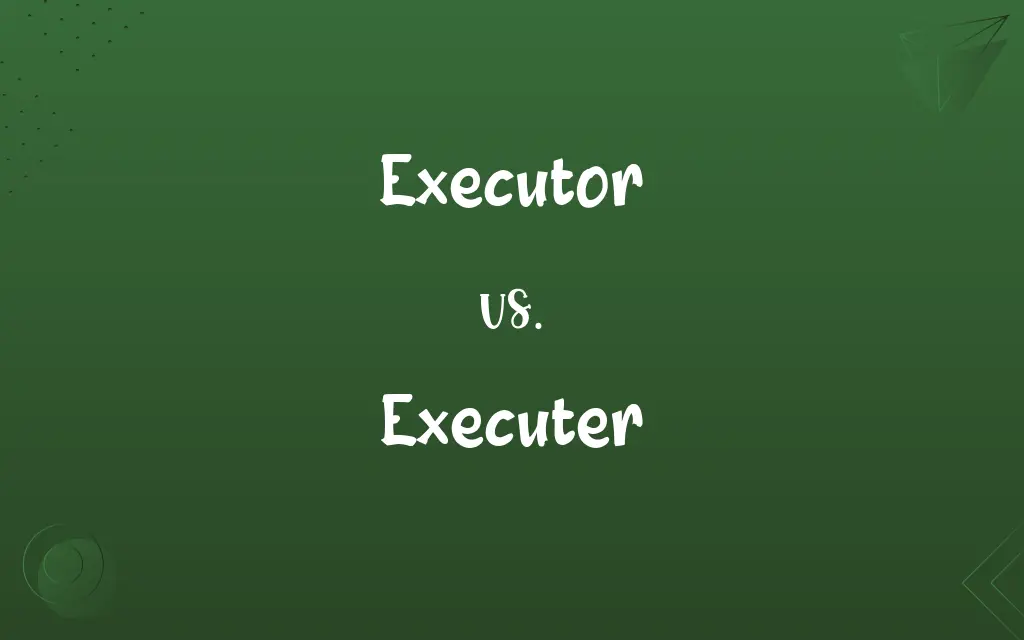Executor vs. Executer: Know the Difference

By Shumaila Saeed || Updated on December 25, 2023
An executor is a person appointed to administer the estate of a deceased person, while an executer is a person who executes or carries out a task or duty.

Key Differences
An executor is specifically designated in a will to administer the estate of the deceased. This role involves legal responsibilities such as distributing assets, paying debts, and fulfilling the wishes of the deceased as outlined in their will. An executer, on the other hand, refers more broadly to anyone who performs or carries out a specific action or task, which can be in various contexts, not limited to legal or estate matters.
Shumaila Saeed
Nov 10, 2023
The role of an executor is bound by legal obligations and is a position of trust. Executors must act in the best interests of the deceased’s estate and the beneficiaries. Conversely, an executer's role is not necessarily defined by a legal framework or a fiduciary duty, but rather by the nature of the task they are executing, which could be in any field like business, technology, or arts.
Shumaila Saeed
Nov 10, 2023
Executors are often involved in complex legal processes, requiring them to navigate through legal paperwork, court proceedings, and financial management. Their responsibilities are specific to the administration of an estate. An executer, however, could be involved in executing a wide range of activities, from simple tasks like executing a plan or project to more complex roles like executing a company’s strategy or a technical procedure.
Shumaila Saeed
Nov 10, 2023
The appointment of an executor is usually made through a legal document (a will) and is often overseen by legal authorities or courts. This role is typically filled by a close family member, friend, or a legal professional. An executer, in contrast, is designated based on their ability or expertise to carry out a particular task or job, without the necessity of a legal appointment or oversight.
Shumaila Saeed
Nov 10, 2023
Executors have a legal and ethical responsibility to fulfill their role with honesty and integrity, often requiring them to manage conflicts among beneficiaries or interpret the will’s instructions accurately. Executers, while they may face ethical considerations depending on their task, are primarily focused on efficiently and effectively completing the task at hand, with their responsibilities defined by the nature of the task rather than a legal or ethical obligation to a deceased person’s wishes.
Shumaila Saeed
Nov 10, 2023
ADVERTISEMENT
Comparison Chart
Role Definition
Administers the estate of a deceased person.
Executes or carries out a task or duty.
Shumaila Saeed
Nov 10, 2023
Legal Obligation
Bound by legal responsibilities to an estate.
No inherent legal obligation to an estate.
Shumaila Saeed
Nov 10, 2023
Context of Role
Specific to estate administration.
Can be in any field or context.
Shumaila Saeed
Nov 10, 2023
Appointment
Appointed through a will or legal document.
Appointed based on ability or expertise.
Shumaila Saeed
Nov 10, 2023
Responsibilities
Distributes assets, pays debts, fulfills the will.
Varies based on the task or job at hand.
Shumaila Saeed
Nov 10, 2023
ADVERTISEMENT
Executor and Executer Definitions
Executor
A person appointed to carry out the terms of a will.
The executor of her father's estate handled all the legal proceedings.
Shumaila Saeed
Nov 10, 2023
Executer
Someone who accomplishes or performs a certain task.
The executer of the technical procedure followed all protocols accurately.
Shumaila Saeed
Nov 10, 2023
Executor
Someone responsible for administering an estate post-death.
As the executor, he distributed the assets among the beneficiaries.
Shumaila Saeed
Nov 10, 2023
Executer
Someone responsible for implementing a plan or procedure.
As the executer of the project, she oversaw all the operations.
Shumaila Saeed
Nov 10, 2023
Executor
A fiduciary appointed to settle a deceased person's affairs.
The executor faced challenges in interpreting the complex will.
Shumaila Saeed
Nov 10, 2023
ADVERTISEMENT
Executer
An individual who executes or completes a specific action.
The executer of the event handled the logistics flawlessly.
Shumaila Saeed
Nov 10, 2023
Executor
A legal representative of a deceased person’s estate.
The executor was tasked with paying off the estate's debts.
Shumaila Saeed
Nov 10, 2023
Executer
A person in charge of carrying out a defined task.
The executer of the company’s strategy played a key role in its success.
Shumaila Saeed
Nov 10, 2023
Executor
A person who carries out the instructions in a will.
The executor organized the funeral as per the will’s directions.
Shumaila Saeed
Nov 10, 2023
Executer
To put into effect; carry out
A government that executes the decisions of the ruling party.
Shumaila Saeed
Oct 19, 2023
Executor
(Law) A person who is appointed by a testator to execute the testator's will.
Shumaila Saeed
Oct 19, 2023
Executer
To create (a work of art, for example) in accordance with a prescribed design.
Shumaila Saeed
Oct 19, 2023
Executor
(computing) A component of a system that executes or runs something.
Shumaila Saeed
Oct 19, 2023
Executer
To perform or carry out what is required by
Execute the terms of a will.
Shumaila Saeed
Oct 19, 2023
Executor
(legal) Someone appointed by a testator to administer a will; an administrator.
Literary executor
Shumaila Saeed
Oct 19, 2023
Executor
One who executes or performs; a doer; as, an executor of baseness.
Shumaila Saeed
Oct 19, 2023
Executor
An executioner.
Delivering o'er to executors paw The lazy, yawning drone.
Shumaila Saeed
Oct 19, 2023
Executor
The person appointed by a testator to execute his will, or to see its provisions carried into effect, after his decease.
Shumaila Saeed
Oct 19, 2023
Executer
A person who performs or carries out a task or duty.
The executer of the plan ensured all phases were completed on time.
Shumaila Saeed
Nov 10, 2023
Executor
A person appointed by a testator to carry out the terms of the will
Shumaila Saeed
Oct 19, 2023
Repeatedly Asked Queries
Can an executer be involved in legal matters?
While an executer can be involved in legal matters, their role is not inherently legal like that of an executor.
Shumaila Saeed
Nov 10, 2023
Are executors paid for their work?
Executors may be entitled to compensation for their time and expenses, especially if not a beneficiary of the will.
Shumaila Saeed
Nov 10, 2023
Can anyone be an executer of a task?
Generally, anyone can be an executer of a task, depending on their skills and the nature of the task.
Shumaila Saeed
Nov 10, 2023
What are the liabilities of an executor?
Executors can be legally liable for mishandling estate assets or failing to adhere to the will’s terms.
Shumaila Saeed
Nov 10, 2023
What qualifications are needed to be an executor?
An executor must be a legal adult and is often chosen for their trustworthiness and ability to handle legal and financial matters.
Shumaila Saeed
Nov 10, 2023
Is being an executer a long-term role?
The role of an executer is usually limited to the duration of the specific task or project they are handling.
Shumaila Saeed
Nov 10, 2023
What skills are beneficial for an executer?
Effective planning, organization, and expertise in the relevant field are beneficial for an executer.
Shumaila Saeed
Nov 10, 2023
Are executors always family members?
Executors are often family members but can also be friends, attorneys, or financial advisors.
Shumaila Saeed
Nov 10, 2023
Can there be multiple executers for a task?
Yes, a task or project can have multiple executers, especially if it is complex.
Shumaila Saeed
Nov 10, 2023
How does one become an effective executer?
Being organized, detail-oriented, and knowledgeable about the task are key to being an effective executer.
Shumaila Saeed
Nov 10, 2023
What if there is no executor named in a will?
If no executor is named, the court will appoint someone to administer the estate.
Shumaila Saeed
Nov 10, 2023
Can an executor decline their role?
Yes, an appointed executor can decline the role, and a substitute executor may be appointed.
Shumaila Saeed
Nov 10, 2023
Can executors make decisions about asset distribution?
Executors must distribute assets according to the will’s instructions and cannot make arbitrary decisions.
Shumaila Saeed
Nov 10, 2023
Is the role of an executer always formal?
The role of an executer can be formal or informal, depending on the context and nature of the task.
Shumaila Saeed
Nov 10, 2023
How is an executor appointed?
Executors are typically appointed through a will or, if none exists, by a court.
Shumaila Saeed
Nov 10, 2023
What challenges might an executer face?
An executer might face challenges like coordinating team efforts, meeting deadlines, or managing resources.
Shumaila Saeed
Nov 10, 2023
Can executors handle international estates?
Executors can handle international estates, but it may require understanding of different legal systems.
Shumaila Saeed
Nov 10, 2023
Are executers limited to certain industries or fields?
Executers are not limited to specific industries; they can operate in any field where tasks need execution.
Shumaila Saeed
Nov 10, 2023
What happens if an executor mismanages the estate?
If an executor mismanages the estate, they can be held legally accountable and may face litigation.
Shumaila Saeed
Nov 10, 2023
Do executers work independently or in teams?
Executers can work independently or as part of a team, depending on the task.
Shumaila Saeed
Nov 10, 2023
Share this page
Link for your blog / website
HTML
Link to share via messenger
About Author
Written by
Shumaila SaeedShumaila Saeed, an expert content creator with 6 years of experience, specializes in distilling complex topics into easily digestible comparisons, shining a light on the nuances that both inform and educate readers with clarity and accuracy.









































































